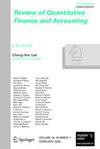CEO power, corporate risk management, and dividends: disentangling CEO managerial ability from entrenchment
IF 1.9
Q2 BUSINESS, FINANCE
引用次数: 0
Abstract
Abstract We contribute to the literature on dividend policy by considering two largely ignored, yet important factors, namely CEO power and corporate risk management. We first disentangle CEO managerial ability from entrenchment - the two sources of leadership autonomy that are not normally distinguished in prior literature. Using UK (re)insurance data that allows us to objectively and reliably quantify risk management and to identify powerful stakeholders with monitoring incentives (e.g., shareholders and regulatory body), we find that risk management enables entrenched CEOs to increase dividends to avoid monitoring by shareholders without compromising financial resilience and increasing the risk of regulatory scrutiny. Further, we neither find the degree of CEO managerial ability nor its interaction with risk management to be related to dividends, suggesting that the competing incentives for talented CEOs to pay higher/lower level of dividends cancel out in cross-sectional tests. Nonetheless, we find that the signalling effects of dividends for future accounting earnings only exist in insurers with high ability CEOs. This is consistent with the view that talented CEOs are able to generate sustainable earnings, and when they choose to pay (more) dividends, they do so to externally signal their managerial ability.CEO权力、公司风险管理与股利:从CEO管理能力与企业壕沟中分离出来
摘要本文通过考虑CEO权力和公司风险管理这两个被忽视的重要因素,对股利政策的研究文献进行了贡献。首先,我们将CEO的管理能力与“壕沟”区分开来——这是领导自主性的两个来源,在之前的文献中通常没有加以区分。使用英国(再)保险数据,使我们能够客观可靠地量化风险管理,并识别具有监督激励的强大利益相关者(例如股东和监管机构),我们发现风险管理使根深蒂固的首席执行官能够增加股息以避免股东的监督,而不会损害财务弹性并增加监管审查的风险。此外,我们既没有发现CEO管理能力的程度,也没有发现其与风险管理的相互作用与股息有关,这表明有才华的CEO支付更高/更低水平股息的竞争激励在横断面检验中相互抵消。尽管如此,我们发现股息对未来会计收益的信号效应只存在于拥有高能力ceo的保险公司中。这与以下观点是一致的:有才能的首席执行官能够产生可持续的收益,当他们选择支付(更多)股息时,他们这样做是为了向外界表明他们的管理能力。
本文章由计算机程序翻译,如有差异,请以英文原文为准。
求助全文
约1分钟内获得全文
求助全文
来源期刊

Review of Quantitative Finance and Accounting
BUSINESS, FINANCE-
CiteScore
3.20
自引率
17.60%
发文量
87
期刊介绍:
Review of Quantitative Finance and Accounting deals with research involving the interaction of finance with accounting, economics, and quantitative methods, focused on finance and accounting. The papers published present useful theoretical and methodological results with the support of interesting empirical applications. Purely theoretical and methodological research with the potential for important applications is also published. Besides the traditional high-quality theoretical and empirical research in finance, the journal also publishes papers dealing with interdisciplinary topics.
 求助内容:
求助内容: 应助结果提醒方式:
应助结果提醒方式:


